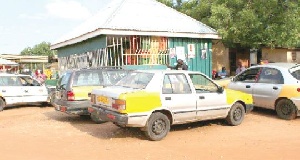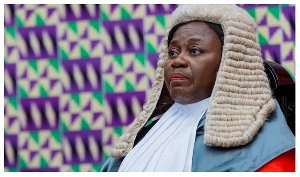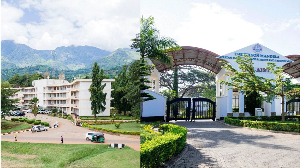Around the terminals of the Intercity STC and Metro Mass Transport Limited in Wa, four taxis have become a permanent feature.
They symbolise what remains of a once booming taxi market that has gone virtually dead in the capital of the Upper West Region, following a mini revolution ignited by the introduction of the TVS passenger tricycles in town.
Once in a while, they look like abandoned machines, their sometimes dusty bodies betraying their long spells of inactivity.
Topsy-turvy life
The vehicles have come to represent an almost forgotten taxi transport system in Wa, and portray the topsy-turvy life of man and business. Indeed, it is a swap of fates and fortunes between the taxis and tricycles in one of the dramatic life-changing stories that may easily relate to any human endeavour.
John Mahama camboo
In their stead, those tricycles – commonly called John Mahama camboo, in virtual tribute to the former President under whose tenure they were introduced — have become the commonest sight in town, the humming sound of their engines now too familiar and recognisable.
It is the kind of swap of fate that has rendered the taxis redundant in the abundance of Mahama camboos, thus switching and swinging economic power from taxis and their drivers to camboos and their riders.
Until the advent of the camboos, taxis had just the one-route ‘trotros’ for competition, and appeared to exploit the undeveloped inter-town commercial transport system to their full advantage. So, for areas that were too far from the Bamahu-Sombo route of the trotros, taxi drivers demanded their pound of flesh in rendering service to willing clients.
Painful life of taxis
The reality of the painful life of taxis in Wa today is better told by the common trend of taxi owners trading their vehicles cheaply to acquire the more expensive camboos.
Indeed, at almost GH¢12,000, a camboo is perhaps three or four times more expensive than the well-used taxis manning the roads in Wa.
Those who have refused to accept the reality of the times continue to ride on the empty pride as ‘car owners’ to the detriment of their businesses and perhaps family upkeep.
Some of the 'camboos' at a filling station
“Times are very hard, but we are managing,” 41-year-old Musinus Seidu, one of the last-standing taxi drivers operating in Wa township, told the Daily Graphic.
Heftly built Seidu looked close to tears as he lamented the drastic decline of business from the good times of about three years ago to the present day near disaster.
“The ‘camboo’ business has destroyed our taxi work in town totally. A few years ago, taxi drivers were doing well in the business. Since the ‘camboos’ came, they have taken over everything. It is only once in a while that people come to us,” he said in a calm voice that perhaps revealed very little about the frustrations of idling around for prospective clients.
His taxi, a Daewoo make, was registered in 2010, and though he owns it with pride, he admitted that he was now largely feeding on the savings of the past 10 years of taxi driving.
There were others who transited quickly from taxi to ‘camboo’.
The 'camboos' are now a major passenger transport system in Wa
Salifu Sabogu, who now chairs one of the local unions of the tricycle transport business, said he sold his two taxis to acquire a ‘camboo’. And now he owns two of them.
“The cost of taxis in Wa dropped sharply, and so people came from Kumasi for our taxis,” he told the Daily Graphic.
Ghost town
That could partly explain why the once busy taxi station has become a ghost town only occupied by a defiant squad hoping for a miraculous turnaround or the odd windfall.
Taxis that are truly functional only connect Wa and other districts such as Nadowli, Jirapa and Lawra on distant routes where the ‘camboo’ cannot compete on speed and endurance needed for such trips.
But the story could have been very different if only taxi drivers had not restricted themselves to ‘dropping’ and ‘charter’. If only they had been modest and considerate with their fare charges. If only they had been willing to ply the routes in town from a central terminal.
Instead, they controlled the demand for their services with iron fists. And when clients came calling, the terms included a compulsory ‘dropping’ or ‘charter’ arrangement accompanied by the usual exorbitant fare.
The consequence of this was an increase in the demand for motorbikes as a convenient alternative means of transport which meant that nearly every household or family in Wa owned one.
The four defiant taxis have become a permanent feature around the Metro Mass terminal
The Sumbo Tricycle Union has registered 250 tricycles under its umbrella, and Mr Sabogu said there could be up to 1,000 ‘camboos’ working in Wa, many of them unregistered.
They operate by traversing the streets of Wa to even the remotest parts, offering passengers easy access to the nooks and cranny of town.
“It has opened up the system so much that the stress of travelling to some difficult to access areas is no longer there,” Daud Musah, a student, said.
That sums up the impact of the ‘camboo’ on Wa.
Opinions of Thursday, 23 August 2018
Columnist: Michael Quaye















